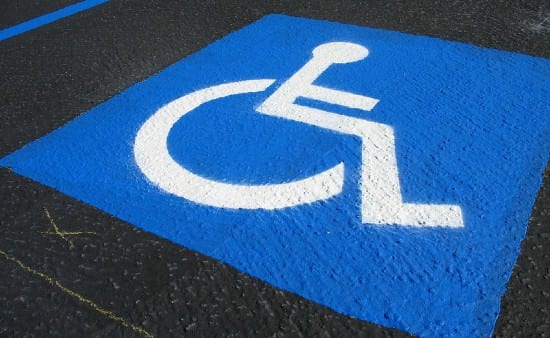Before we talk about masks and about the weird, religiously politicized toxic indignation that causes so many of our fellow citizens to refuse to wear them, we’re going to have to talk about handicapped parking spaces. (For a preview of where this is going, see this excellent Twitter thread by Matthew Cortland. But we’re not going there quite yet.)
Handicapped parking spaces are a Good Thing. The basic idea is quite simple: Some of us can’t get around as easily as the rest of us can, so we’ve all decided to set aside a little bit of space closer to the door to make sure those folks don’t have to make their way across the entire parking lot when they go to the supermarket.

This obviously doesn’t provide total accessibility for people with disabilities. It doesn’t address all problems or completely solve anything. It’s tied up with our automobile-shaped culture that is, itself, dysfunctional and harmful in so many other ways. And the language here — “handicapped spaces” — already seems dated and problematic. But for all of that, the idea — and our implementation of the idea — of accessible parking spaces is a Good Thing. It’s a small way of making life a little bit easier for people whose lives are otherwise a little bit harder. And it’s a bright blue recurring reminder for all of us, every day, that we’re capable of choosing not to be assholes.
It’s good for all of us, I think, to view them this way — to allow them to serve as a reminder that we are, collectively, capable of such a choice, and that we in fact have already made such a choice. But seeing those designated parking spaces should also be a reminder that it always is a choice — something that we must choose again and again, perpetually, because we are all also capable of choosing the other way. So we can see those spaces and be reminded that this was a choice we needed to bind ourselves to. We can, and should, be proud that this was a commitment we made, and we can and should be humbled and cautious due to the realization that this was a commitment we needed to make because we know ourselves to be more than capable of failing to live up to it.
Laws reserving accessible parking spaces, in other words, are an expression of what Reinhold Niebuhr was getting at when he said that our capacity for justice makes democracy possible, while our inclination to injustice makes democracy necessary. In our better moments, we humans have the capacity not to be assholes to one another. In our weaker moments, though, we’re not just capable, but inclined to be total assholes to one another. Most of us know that we can be real assholes sometimes, but most of us also don’t want to be that. And so, recognizing this about ourselves, we chose to make a law to hold ourselves to living up to the better angels of our nature. That’s a Good Thing.
I’m trying to avoid moralistic and sectarian language here, but please note that this effort is not a matter of altruism — of trying to be nice. It’s a matter of justice — of doing right by those who face additional challenges because that is what we would want for ourselves if we were in their place. John Rawls mighty attempt to prove that justice is rational may be too abstract to be entirely compelling, but in this case — the justice owed to those who have a disability — his hypothetical “veil of ignorance” argument is not entirely hypothetical. Most of us — at least in our better moments — realize that we will one day require this kind of assistance ourselves. That day might not be until years from now, due to the aging that inexorably occurs to us all, but it also might happen at any moment. We’re talking about parking spaces, after all, something we only need because we’re driving around in cars all the time. And even though we do our best not to think about it, we’re all still dimly aware of the risk that entails. Every able-bodied driver is just one squeal of the brakes and sickening crunch away from their next car having “handicapped” plates.
If you’re out and about running errands, please wear a mask. Please also keep an eye out for those accessible parking spaces that we’ve required ourselves to reserve in nearly every public parking area. Look at them. See them. Listen to them. Hear what they’re telling us about the choices we can make and the choices we have made and the choices we are making, every day, about whether or not we want to be assholes to one another. Remind yourself what choices you have made and what choices you want to make. Remember again the humility and gratitude you ought to feel if, for now, those spaces are not yet for you.
Practice the liturgy of accessible parking spaces. It’s good practice for not being an asshole in all of life. And it will keep you from telling yourself the kind of stunted, resentful lies that will eventually turn you into nothing more than a shambling pile of stunted, resentful lies — the kind of vile, deplorable asshole who refuses to wear a mask during a pandemic.












